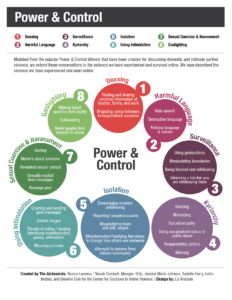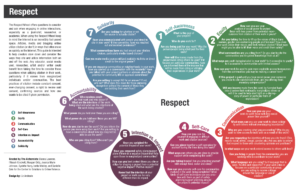Doing better means both being aware of the tools you can leverage to help keep yourself safe in digital spaces and making sure that you are not harming others with your digital practices. Below are a list of our favorite tips and tools, followed by a more general list of resource links.
 |
Our Favorites for Self-Protection
Tactical Tech’s Security-in-a-Box “Although the toolkit was designed primarily to address the growing needs of advocates in the global South – particularly human rights defenders – the software guides and security strategies in this toolkit are relevant to everyone; specifically people working with sensitive information. This may include vulnerable minorities, independent journalists or whistleblowers, as well as advocates working on a range of issues, from environmental justice to anti-corruption.”
Safe Hub Collective’s DIY Guide to Feminist Cybersecurity “You have a right to exist safely in digital spaces. Although we have to rely on outside parties for technology to access these spaces, there are tons of helpful tools and strategies that allow you to take greater control of your digital life and mitigate the risk of malicious threats. We’ll walk through common areas of digital life such as web browsing, private data, and smartphones to show you different ways that you can implement as much or little security as you’re comfortable with. You have power to set boundaries and protections in your digital spaces as you see fit: we hope that this guide will help you to make informed, personal decisions on what is right for you.”
Take Back the Tech’s Safety Toolkit: “We’ve looked at some of the ways tech-related violence occurs, how it violates your rights and what strategies you can use to protect yourself. Here we recommend tried and tested tools for keeping your computer and mobile phone as secure as possible. Most of the tools are free and/or open-source software (known as FLOSS). This software is usually much safer than closed, or proprietary, software created by Microsoft or Apple because it has been independently verified to ensure that it complies with the highest security standards. For that reason, we recommend Android and PC over Apple, though many of the tools we list can be used with either.”
The Electronic Frontier Foundation’s Surveillance Self-Defense.
See also Locking Down Your Digital Identity
 |
Our Favorites To Ensure You’re Not Harming Others
Dorothy Kim and Eunsong Kim’s Twitter Ethics Manifesto
SOCIAL MEDIA ETHICS IN THE CLASSROOM DOWNLOADABLE PDF
The Social Media Ethics handout was created by Digital Alchemy and collaborators and produced by CSOV. The supplementary materials, including the social media ethics videos (coming soon!), were produced by CSOV and coordinated by T.L. Cowan and Moya Bailey.
POWER AND CONTROL WHEEL AND RESPECT WHEEL FOR ONLINE ENGAGEMENT
Digital Alchemy created two powerful graphic tools, The Respect Wheel and The Power and Control Wheel, to help people understand the dynamics of social media violence. Inspired by the Power and Control Wheels used in domestic violence settings, the Power and Control wheel details different kinds of online violence. The Respect wheel details the kinds of questions we should all be asking ourselves when using social media content or engaging social media users.
In addition to the graphic pages, Digital Alchemy and CSOV produced a downloadable Power and Respect handout with both the wheels and a narrative discussion of the issues of power, control, and respect online.
Conference anti-harassment/Policy resources (Geek Feminism Wiki)
General Resources (see also our resources in the sidebar)
Online Safety in Brazil (SaferNet)
Technology Safety (National Network to End Domestic Violence)
On Guard Online (Federal Trade Commission)
Guide to Internet Security (Consumer Reports)
Resources specifically about children/teenagers
Common Sense Education on E-rate and CIPA: Toolkit for Teachers (Common Sense Media)
Internet Safety Toolkit (Center on Media and Childhealth)
Anti-Harassment, Intimidation and Bullying Resources (Safer Schools Ohio)
Cyberbullying & Digital/Internet Safety (OSPI, State of Washington)
Resources specifically for women
Online Safety Toolkit (Status of Women Canada and National Crime Prevention Strategy)
Twitter’s Abuse Problem: Now With Actual Solutions And Science (Women, Action, & the Media)
TEDxWomen Talk about Online Harassment & Cyber Mobs (Feminist Frequency)
Resources for journalists/bloggers
Tips and tools for journalists to deal with online harassment (Natasha Tynes)
International Press Institute: The Global Network for Media Freedom

